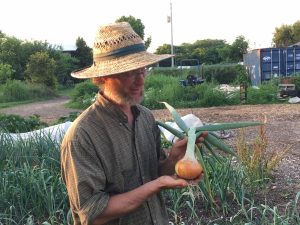Missouri’s array of soils and topography allows producers to grow an extensive list of vegetables, from leafy greens to cucurbits.
Springfield farmer Curtis Millsap is one of many producers who benefit from the College of Agriculture’s Agriculture and Environment guidance on commercial horticulture. Since 2003 he and his wife, Sarah, have been working with MU Extension, particularly horticulture specialist Patrick Byers.
“My MU Extension specialist has been a powerful link to knowledge and expertise that has helped me succeed,” Millsap said. “Before I had the internet, I had Patrick. I’d call Patrick and say, ‘Patrick, what is this thing?’ And he’d say, ‘Oh, well, that’s a squash bug.’ And oftentimes I’d already had the exposure because I would go to a workshop or class that he taught or organized to prepare me to ask the right questions.”
Growing up in the Show-Me State, Millsap began gardening alongside his parents, and he was introduced to dairy farming through his grandparents’ operation. But it wasn’t until years later that Millsap found his calling.
In 2007 the Millsaps bought 20 acres in Greene County at the site of a former greenhouse operation. “From there we made the leap from ‘Maybe we should do this or try that’ to ‘O.K., we’re going to do this full time.’”

They started a local Community Supported Agriculture (CSA) program to sell shares of their harvest. In the beginning, they supplied food for 25 customers with a little under an acre of a garden.
“We’ve grown over the years to up to 7 acres of vegetables,” Millsap said. “Then we shrunk back down to 2 ½ acres, which is what we’re at right now. That seems to be our sweet spot.”
Millsap said MU Extension has been there for him every step of the way. He calls the relationship a “longtime collaboration” because Millsap and Byers work together in the community to “help develop novice growers into growers who can make a living farming.” It’s one way he pays it forward to people who are standing where he once stood.
“One of the first things I tell people who say they want to farm is, ‘You need to connect to extension so you can understand your soils, so you can get connected to the teaching and learning sources that are out there locally, so you can visit other farms as part of a workshop or conference, and so forth,” he said.
Millsap is working with Byers to promote MU Extension’s commercial vegetable production webinar series.
“I think the webinar series will be a really valuable resource, partly because it’s going to be regionally centered,” Millsap said. “For example, if you want to grow vegetables in southwest Missouri, you really need a regional source. That’s what I’m excited about for attendees. I think this webinar will be a powerful source of effective regional information so people can have the best start possible.”
Horticulture specialist Juan Cabrera-Garcia said there are 21 sessions in the webinar series. People can register for the whole series for $150 or sign up for individual sessions for $25 each. A supplemental guide, “Midwest Vegetable Production Guide for Commercial Growers,” is available for $20.
“We’ll be offering classes for different vegetables,” Cabrera-Garcia said. “If someone wants to diversify their operation, this would be a great opportunity to learn how to do so.”
Putting on 21 different sessions is a large team effort involving MU Extension and Lincoln University Cooperative Extension experts throughout the state delivering high-quality content, Cabrera-Garcia said.
“There are many people who are interested in learning how to grow vegetables and become a commercial farmer, so we want to give them the tools and confidence to do so through this webinar series,” he said. “We want to let them know we are here to help them throughout the process. Our main goal is to set them up for success.”
Sessions are 6:30-8 p.m. Mondays and Thursdays through March 22. For registration and a full list of sessions, visit extension.missouri.edu and search for “Commercial Vegetable Production Webinar.” For questions about the webinar, contact Cabrera-Garcia at jcabrera-garcia@missouri.edu.
A limited number of farmer scholarships are available on a first-come, first-served basis. The registration form includes a quick questionnaire to determine eligibility. Scholarships are provided by the Missouri Beginning Farmer and Rancher Development Program grant through the USDA National Institute of Food and Agriculture. For more information about scholarships, contact Debi Kelly at KellyD@missouri.edu.
After completing the sessions, producers are encouraged to reach out to MU Ag & Environment Extension and to a new program of the Missouri Small Business Development Center (SBDC) dedicated to agriculture, food and forestry-related businesses.
“Extension’s educational courses provide a research-based foundation, and now individuals who are currently growing or considering growing can receive confidential one-on-one advice and business assistance at no cost through the Missouri SBDC for Agriculture, Food and Forestry,” said Mallory Rahe, Agricultural Business and Policy education director. “Our faculty specialists are here to help business owners adapt and remain viable, especially due to the stress of COVID-19. Access to a safe food supply is critical. We have resources to help commercial vegetable growers thrive.”